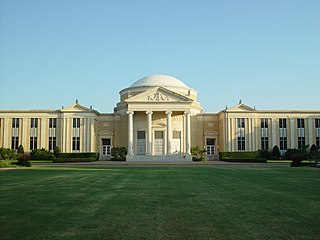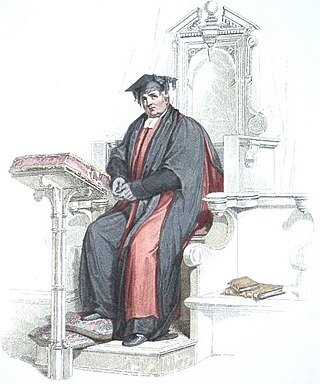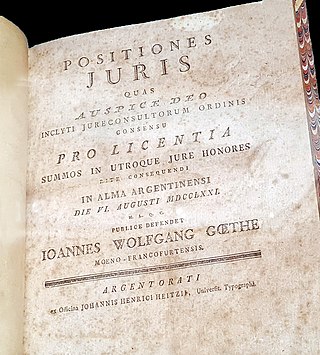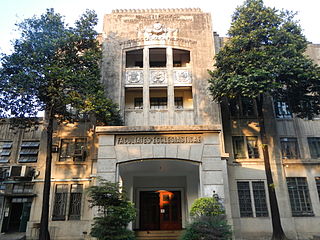Degrees
Studying divinity usually leads to the awarding of an academic degree or a professional degree. Such degrees, particularly in modern times the Master of Divinity, are prerequisites for ordained ministry in most Christian denominations and many other faith communities. The exception to this is all "plain" churches such as the Amish, Old German Baptist Brethren, Old Order Mennonite, Dunkard Brethren, and many others. In fact, such churches hold to the belief that seminaries are an institution of man and not supported by Holy Scripture. Students earn such degrees at a free-standing seminary, theologate or divinity school, or at a university.
List of degrees

The following is a list of most of the common degrees in divinity:
- Bachelor of Arts in Theology (B.A. or A.B.)
- Bachelor of Canon Law (J.C.B.; B.L.C.)
- Bachelor of Divinity (B.D.; B.Div.)
- Bachelor of Hebrew Letters (B.H.L.)
- Bachelor of Ministry (B.Min.)
- Bachelor of Religious Education (B.R.E.)
- Bachelor of Sacred Literature (B.S.Litt.)
- Bachelor of Sacred Music (B.Mus. or S.M.B.)
- Bachelor of Sacred Scripture (S.S.B.)
- Bachelor of Sacred Theology (S.T.B.)
- Bachelor of the History and Cultural Patrimony of the Church
- Bachelor of Theology (B.Th.)
- Lector of Sacred Scripture (S.S.Lect.)
- Lector of Sacred Theology (S.T.Lect.)
- Licentiate of Canon Law (J.C.L.)
- Licentiate of Sacred Music (S.M.L.)
- Licentiate of Sacred Scripture (S.S.L.)
- Licentiate of Sacred Theology (S.T.L.)
- Licentiate of the Cultural Patrimony of the Church
- Licentiate of the History of the Church
- Licentiate of Theology (L.Th.)
- Master of Arts in Theology (M.A. or A.M.)
- Master of Arts in Hebrew Letters (M.A.H.L.—used by some Jewish schools)
- Master of the Cultural Patrimony of the Church
- Master of Divinity (M.Div.—the most common degree taken before ministry in North America)
- Master of Hebrew Letters (M.H.L.—used by some Jewish schools)
- Master of Ministry (M.Min.)
- Master of Philosophy with a specialization in Theology (M.Phil)
- Master of Rabbinic Studies (M.A.R.S.—used by some Jewish schools for Rabbinic ordination)
- Master of Religious Arts (M.R.A.)
- Master of Religious Education (M.R.E.)
- Master of Sacred Literature (M.S.Litt.)
- Master of Sacred Music (M.Mus. or M.S.M.)
- Master of Sacred Theology (S.T.M.)
- Master of Theological Studies (M.T.S.)
- Master of Theology (M.Th., Th.M., M.S.T., or M.Theol.)
- Master of Worship Studies (M.W.S.)
- Doctor of both laws [Doctor of Canon and Civil Laws] (J.U.D.; I.U.D.; D.U.J.; J.U.Dr.; D.U.I.; D.J.U.; Dr.iur.utr.; Dr.jur.utr.; D.I.U.; U.J.D.; U.I.D.)
- Doctor of Canon Law (J.C.D.; I.C.D.; D.C.L.; dr.iur.can.; D.Cnl.; D.D.C.; D.Can.L.)
- Doctor of the Cultural Patrimony of the Church
- Doctor of Divinity (D.D.)
- Doctor of the History of the Church
- Doctor of Ministry (D.Min.)
- Doctor of Missiology (D.Miss.)
- Doctor of Philosophy in Theology (Ph.D.)
- Doctor of Practical Theology (D.P.T., D.Th.P.)
- Doctor of Sacred Literature (D.S.Litt.)
- Doctor of Sacred Music (D.M.A., D.S.M., S.M.D.)
- Doctor of Sacred Scripture (S.S.D.)
- Doctor of Sacred Theology (S.T.D.)
- Doctor of Theology (Th.D., Dr. Theol., D.Theol.)
- Doctor of Worship Studies (D.W.S.)







